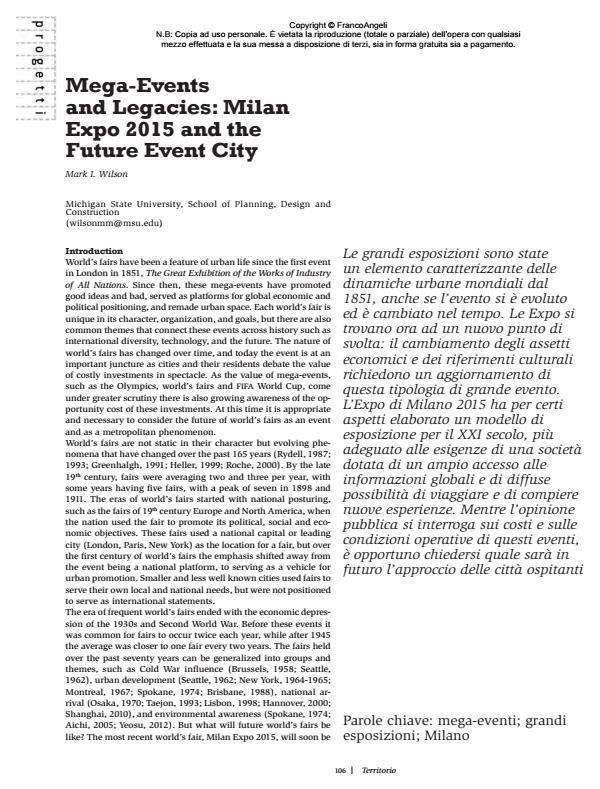Mega-Events and Legacies: Milan Expo 2015 and the Future Event City
Journal title TERRITORIO
Author/s Mark I. Wilson
Publishing Year 2016 Issue 2016/77
Language English Pages 4 P. 106-109 File size 230 KB
DOI 10.3280/TR2016-077017
DOI is like a bar code for intellectual property: to have more infomation
click here
Below, you can see the article first page
If you want to buy this article in PDF format, you can do it, following the instructions to buy download credits

FrancoAngeli is member of Publishers International Linking Association, Inc (PILA), a not-for-profit association which run the CrossRef service enabling links to and from online scholarly content.
Le grandi esposizioni sono state un elemento caratterizzante delle dinamiche urbane mondiali dal 1851, anche se l’evento si è evoluto ed è cambiato nel tempo. Le Expo si trovano ora ad un nuovo punto di svolta: il cambiamento degli assetti economici e dei riferimenti culturali richiedono un aggiornamento di questa tipologia di grande evento. L’Expo di Milano 2015 ha per certi aspetti elaborato un modello di esposizione per il XXI secolo, più adeguato alle esigenze di una società dotata di un ampio accesso alle informazioni globali e di diffuse possibilità di viaggiare e di compiere nuove esperienze. Mentre l’opinione pubblica si interroga sui costi e sulle condizioni operative di questi eventi, è opportuno chiedersi quale sarà in futuro l’approccio delle città ospitanti
Keywords: Mega-eventi; grandi esposizioni; Milano
- Dominant discourses framing the reuse of industrial heritage in the context of mega-events: a relationship matrix approach Florence Graezer Bideau, Huishu Deng, Helena Roux, in Built Heritage 45/2024
DOI: 10.1186/s43238-024-00154-z - Mega-Events and Legacies in Post-Metropolitan Spaces Stefano Di Vita, pp.115 (ISBN:978-3-319-67767-5)
- The Valuation of Idle Real Estate in Rural Areas: Analysis and Territorial Strategies Anna Richiedei, in Sustainability /2020 pp.8240
DOI: 10.3390/su12198240
Mark I. Wilson, Mega-Events and Legacies: Milan Expo 2015 and the Future Event City in "TERRITORIO" 77/2016, pp 106-109, DOI: 10.3280/TR2016-077017